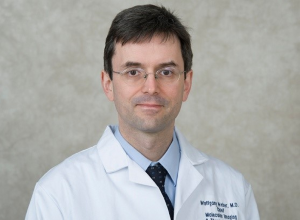Radionuclides for precision medicine of cancer
2nd Grace-MEDICIS Public lecture
by Prof. Wolfgang Weber
Chief, Molecular Imaging and Therapy Service
Department of Radiology - Memorial Sloan Kettering Cancer Center, New York (USA)
Precision medicine aims to fundamentally change cancer therapy and to improve patient outcome by using drugs that specifically target genetic or epigenetic features (that is, well identified and unique fingerprints) of the tumor cells in an individual patient. Radionuclides have unique value to achieve these goals. On the one hand, gamma emitting radionuclides provide the basis for imaging of the expression and function of specific molecules in patients. Because radioactivity can be detected with exceptionally high sensitivity, these imaging studies can be performed safely and are increasingly used guide the treatment of cancer patients. On the other hand beta- and alpha-emitting radionuclides are two other types of radioactive compounds and can deliver therapeutic doses of radiation selectively to destroy cancer cells. This principle has been used for many years already to treat diseases of the thyroid, but more recently it has been expanded to common cancers, such as prostate cancer. A specific strength is the combination of imaging and therapy with radionuclides: imaging is used to detect the presence of disease and to predict the uptake of the therapeutic radionuclide. This presentation will provide an overview of the principles of these “theranostic” (therapeutic/diagnostics) applications of radionuclides and will provide examples for recent clinical successes in using radionuclides in medicine.
___________
Des radionucléides pour une médecine de précision du cancer
2ème Conférence publique Grace-MEDICIS
par le Pr. Wolfgang Weber
Responsable du service d’imagerie moléculaire et de thérapie
Département de radiologie – Memorial Sloan Kettering Cancer Center, New York (USA)
L’objectif de la médecine de précision est de transformer fondamentalement le traitement du cancer et d'améliorer les résultats pour les patients par le biais de médicaments ciblant de manière spécifique les caractéristiques génétiques ou épigénétiques (c'est-à-dire l’empreinte unique et bien définie) des cellules tumorales d’un patient. Les radionucléides, dans cette perspective, présentent un énorme potentiel. Tout d’abord, les radionucléides à émission de gamma servent de base à l'imagerie de l'expression et de la fonction de molécules spécifiques chez les patients. Puisque la radioactivité peut être détectée avec une sensibilité exceptionnelle, les études par imagerie peuvent être réalisées en toute sécurité et sont de plus en plus fréquemment utilisées pour orienter le traitement du cancer. Par ailleurs, les radionucléides à émission beta et alpha, deux autres types de composés radioactifs, sont capables de cibler les cellules cancéreuses afin de les détruire. Ce principe est utilisé depuis de nombreuses années déjà pour le traitement des maladies thyroïdiennes, mais il a récemment été étendu au traitement des cancers les plus courants, comme le cancer de la prostate. Il est particulièrement utile de combiner l'imagerie et le traitement par radionucléides, l'imagerie servant à déceler la présence de la maladie et à prédire l’incorporation des radionucléides thérapeutiques. La conférence donnera un aperçu des applications « théranostiques » (thérapeutiques et diagnostiques) des radionucléides et présentera des exemples récents de succès cliniques grâce à l’utilisation des radionucléides en médecine.
